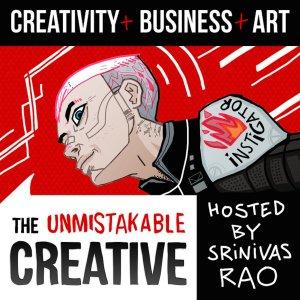The Unmistakable Creative Podcast

Best of 2015: The DNA of a Storyteller with Robert Kurson
Robert Kurson shares his journey from being an F-student in high school, to a desperately unhappy Harvard educated Lawyer and eventual New York Times Bestselling AuthorHIGHLIGHTS: A formative relationship that played a fundamental role in Robert’s career Why a strong work ethic is important for a creative career The struggles of a challenging academic career Finding a level of belief that keeps you going From F’s in High School to Harvard School The power of being desperately unhappy Making a drastic identity shift that allows us to produce incredible results Finding meaning in the activities in which we lose track of time How small opportunities can change into big change in our lives Why we must take risk and experience temporary pain for our greatest achievements Why unhappiness increases our capacity for taking risk Mastering craft the storytelling Developing a sense for how a good story sounds The power of speaking from the heart QuotesReally great storytellers are people who notice the most (Click to Tweet)A well told story is a universal thing (Click to Tweet)Robert Kurson is an American author, best known for his 2004 bestselling book, Shadow Divers, the true story of two Americans who discover a World War II German U-boat sunk 60 miles off the coast of New Jersey. His new book Pirate Hunters is a gripping, true story today, of the hunt for lost gold, bitter rivalries on the high seas, a long-ago legendary pirate captain, and two adventurous American men determined to win treasure - and find something even deeper - along the way.Kurson began his career as an attorney, graduating from Harvard Law School, and practicing real estate law. Kurson’s professional writing career began at the Chicago Sun-Times, where he started as a sports agate clerk and soon gained a full-time features writing job. In 2000, Esquire published “My Favorite Teacher,” his first magazine story, which became a finalist for a National Magazine Award. He moved from the Sun-Times to Chicago magazine, then to Esquire, where he won a National Magazine Award and was a contributing editor for years. His stories have appeared in Rolling Stone, The New York Times Magazine, and other publications






 Visit Podcast Website
Visit Podcast Website RSS Podcast Feed
RSS Podcast Feed Subscribe
Subscribe
 Add to MyCast
Add to MyCast